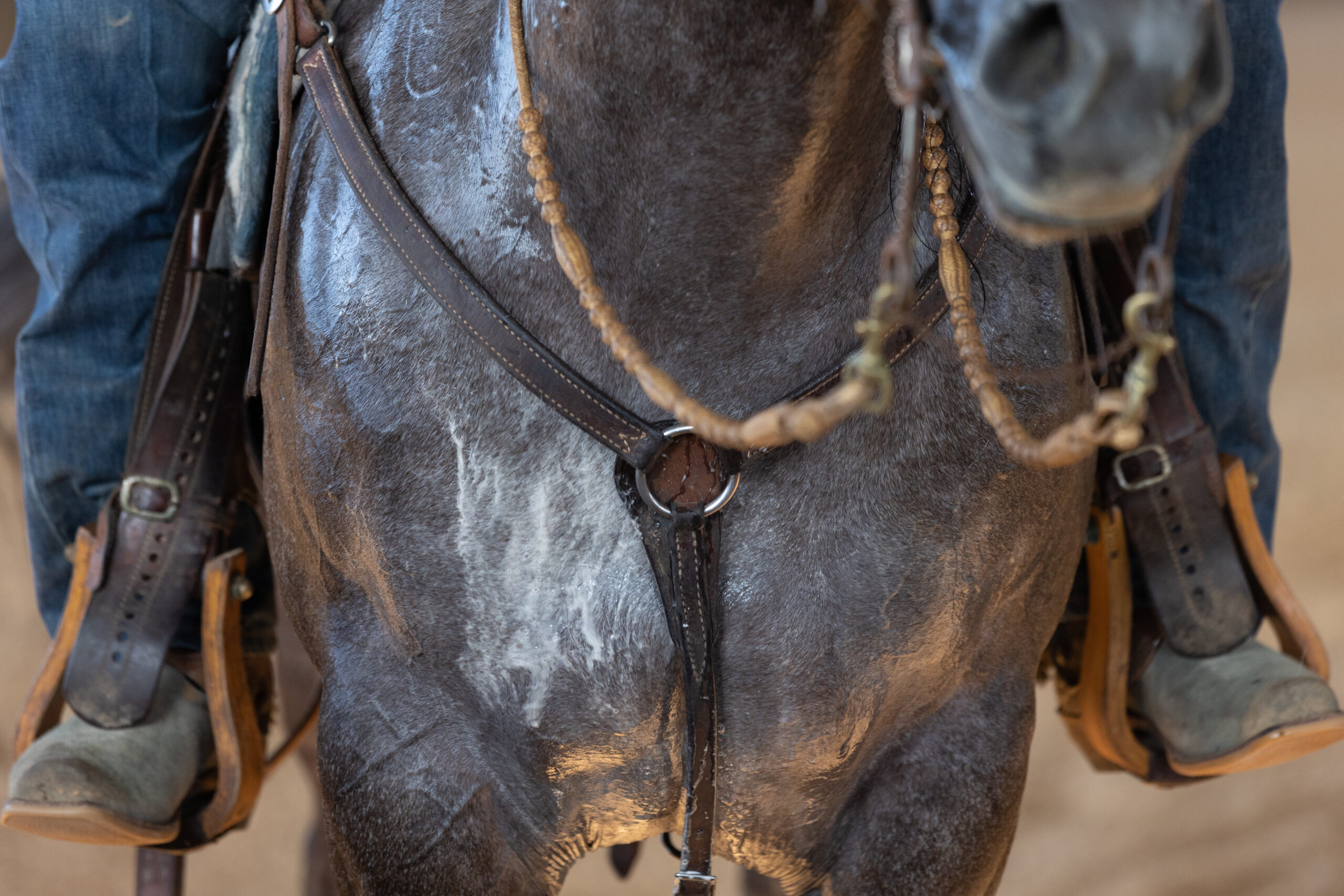Why Your Horse Sweats (And When to Be Concerned)

Sweating is a natural process that helps regulate body temperature in horses, just like it does in humans. But have you ever wondered why and how horses sweat? And what exactly is considered normal sweating for our equine companions?
In this article, let’s look at the science behind why horses sweat, what can cause abnormal sweating, and some important information to keep in mind as horse owners.

The Purpose of Sweating
Sweating is essential for maintaining the body’s core temperature within a safe range. When your horse’s internal temperature rises due to exercise or high environmental temperatures, his sweat glands kick into action. Sweat is mostly composed of water and electrolytes, such as sodium and potassium.
As the sweat evaporates from your horse’s skin, it helps to cool him down. This process is known as evaporative cooling and is crucial for preventing heat exhaustion in horses.
The Anatomy of Sweat Glands
Horses have two types of sweat glands: eccrine and apocrine. Eccrine glands are found all over your horse’s body, but are most concentrated on his head, neck, and chest. These glands produce clear, watery sweat that helps with temperature regulation.
Apocrine glands are found in areas where hair follicles are present, such as the armpits and groin. These glands produce a thicker, oilier sweat that is responsible for creating an individual horse’s unique scent. (Raise your hand if you love the smell of a sweaty horse.)
Normal Sweating in Horses
As mentioned before, your horse will sweat mainly to regulate his body temperature. So it’s normal for him to sweat after a workout or when exposed to high temperatures. However, some other factors can also trigger sweating in horses, such as stress or pain.
It’s essential to pay attention to your horse’s sweating patterns and take note of any changes. For example, if your horse typically sweats after a workout, but suddenly stops sweating altogether, that could be a sign of an underlying issue. Likewise, excessive or sudden sweating in a cool environment can also be cause for concern.
Abnormal Sweating
Excessive sweating in horses, also known as hyperhidrosis, can be indicative of underlying health issues such as heat stress, dehydration, pain, fever, metabolic imbalances, or even more serious conditions like equine exertional rhabdomyolysis (tying-up).
In anhidrosis, a condition characterized by an inability to sweat when faced with a hot or humid ambient environment or exercise, horses don’t sweat. Even in circumstances where it’s expected such as during exercise or in hot, humid environments. Anhidrosis is most common in warm, coastal regions, and is often made worse by the fact the heat and moisture can reduce sweat evaporation. While a specific cause hasn’t been confirmed, some syndromes have been identified as culprits including hypothyroidism, low blood-chloride concentration, and elevated epinephrine (or adrenaline) levels. The general acceptance is that, regardless of the cause, the culprit is the sweat glands themselves. In acute cases, it seems to be a temporary dysfunction, whereas in chronic conditions the glands are commonly permanently damaged.
Monitoring the pattern and extent of abnormal sweating, along with other accompanying symptoms like lethargy, rapid breathing, or changes in behavior, is crucial for assessing your horse’s well-being. Prompt veterinary attention should be sought to diagnose the root cause of the abnormal sweating.
Abnormal Sweat: Possible Causes
Abnormal sweating in horses can be caused by various factors, and it’s crucial to identify the root cause to provide proper treatment. Some common causes of abnormal sweating in horses include:
- Heat exhaustion or heatstroke: When a horse is exposed to high temperatures and doesn’t have adequate access to water or shade, he may develop heat exhaustion or even heatstroke.
- Pain or discomfort: Horses may also sweat excessively if they are in pain or discomfort due to an injury or illness.
- Anhidrosis: Since horses typically lose 65% to 70% of body heat through sweating, non-sweating severely limits a horse’s ability to maintain a safe internal body temperature. This is dangerous as they overheat, potentially experiencing heat stroke or exhaustion, and even death as vital internal organs begin to shut down.
- Stress or anxiety: Just like humans, horses can also experience stress and anxiety, which can cause them to sweat more than usual.
If you notice abnormal sweating in your horse, it’s best to consult with a veterinarian to determine the underlying cause.
Important Tips
As horse owners, it’s essential to understand the importance of proper hydration and cooling methods for our equine companions. Here are some tips to keep in mind:
- Always provide access to clean, fresh water for your horse.
- Ensure that your horse has access to shade and shelter, especially during hot weather.
- Monitor your horse’s sweating patterns and take note of any changes.
- After a workout or in hot weather, give your horse time to cool down properly before returning him to his stall or pasture.
- Be mindful of the signs of heat exhaustion or heatstroke, such as increased heart rate, excessive sweating, and rapid breathing.
In conclusion, horses sweat for the same reason humans do – to regulate body temperature. It is a natural and necessary process for our equine companions. However, abnormal sweating can be a sign of an underlying issue. So it’s important to monitor your horse’s sweating patterns and consult with a veterinarian if you notice any changes.

